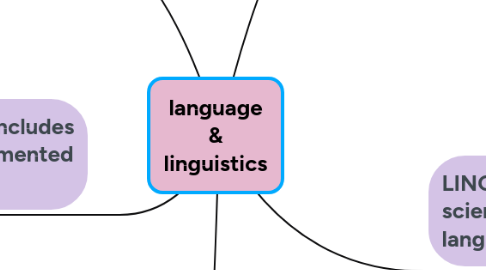
1. LANGUAGE is commonly defined(simply) as "a means of communication"
1.1. To be more scientific, a language can be defined as : "An arbitrary system of creative vocal symbols used as a means of communication among human beings"
2. GRAMMAR (the study of such rules, and this field includes morphology, syntax, and phonology, often complemented by phonetics, semantics, and 8 pragmatics)
2.1. MENTAL GRAMMAR : lnternal linguistic knowledge
2.2. DESCRIPTIVE GRAMMAR : how people do speak in actual utterances
2.3. PRESCRIPTIVE GRAMMAR : a set of prescribed rules which tells people how to speak/write
2.4. PEDAGOGICAL GRAMMAR : teaching grammar widely used in schools
2.5. TRANSFORMATIONAL GRAMMAR : applied to the deep structure and the intermediate structures, ultimately generating the surface structure of the sentence
3. LINGUSITIC THEORIES
3.1. Structural Linguistics
3.1.1. explains that language is composed of signs-signifier and signified.
3.2. Generative Linguistics
3.2.1. explains language explicitly, making use of rules in a given lnguage.
4. LINGUISTIC KNOWLEDGE
4.1. We have linguistic knowledge two aspects of knowledge
4.1.1. Linguistic competence (is knowledge of language.)
4.1.2. Linguistic performance (is the use of language in speaking and understanding utterances is linguistic performance.)
4.2. Linguistic knowledge of three major components: pronunciation,words and sentences
5. LINGUISTICS is the scientific study of natural languages
5.1. Branches of linguistics
5.1.1. Phonology (the study of speech sound and their patterns)
5.1.2. Phonetics (the scientific study of speech sounds)
5.1.3. Morphology (the study of words and word formation)
5.1.4. Syntax (the study of sentence structure)
5.1.5. Semantics (the study of meanings)
5.1.6. Pragmatics (the study of the language in use in context)
5.1.7. Psycholinguistics (the study of language and mind)
5.1.8. Neurolinguistics (the study of language processing and language representation in the brain)
5.1.9. Sociolinguistics (the study of impact of language on social groups in a society)
5.1.10. Historical linguistics (the study of language change through history)

